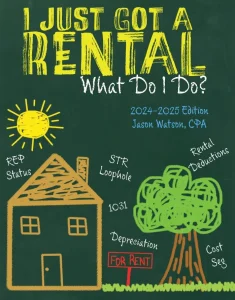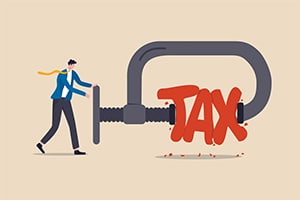
Business Advisory Services
Everything you need to help you launch your new business entity from business entity selection to multiple-entity business structures.
Hey - Our site just had a makeover and we are sorting through the hiccups!
Hey - Our site just had a makeover and we are sorting through the hiccups!

Everything you need to help you launch your new business entity from business entity selection to multiple-entity business structures.

Designed for rental property owners where WCG CPAs & Advisors supports you as your real estate CPA.

Everything you need from tax return preparation for your small business to your rental to your corporation is here.

Table Of Contents

Before we dive into the nitty gritty of this new bill, here are some of the key highlights specific to our clients.

There are a ton of crazy tax provisions in the OBBB, OBBBA, or OB3, but we will focus on those most impactful to WCG CPAs & Advisors’ clients. Here we go-
There are several other things, but in our opinion, these are the big ones for most small business owners and rental property investors.
Of course some will consider OBBB to stand for One Big Bloated Bill. It’s classic legislation written by hundreds, each with someone to answer to. Oh well.
Just like any other major tax reform, it generally starts off as an amendment to the 1986 Internal Revenue Code (IRC). Since the One Big Beautiful Bill is written in crayon, ping-ponged like a hot potato, and hurried along without care for accuracy and exactness, the Treasury Department and Internal Revenue Service must now explain, curtail, expand and offer guidance on how to interpret and deploy the madness.
Typically, it goes like this- the Treasury Department will issue temporary regulations and ask industry leaders and others for opinions, questions and whatnot. They also attempt to offer definitions and clear up ambiguities. Tax code ambiguous? Nah, not our tax code!
Next, once the temporary regulations are finalized, the IRS steps in with Revenue Procedures, updated Publications, new or modified tax forms, and other memorandums including procedural guidance.
Sidebar: With all major tax reform including OBBB, you can expect delayed tax forms especially at the state level. The good news is that this bill is being signed into legislation in July and not December like TCJA was. All the same, states usually stink at getting their poop in a group when tax season rolls around.
As such, when you have a zillion questions, just like with Tax Cuts and Jobs Act of 2017 (TCJA), you’ll need to exercise some patience for the finer details and nuances for your unique tax footprint. In other words, some email restraint is in order as we all navigate this.
The good news with TCJA is that the 21% corporate tax rate was never going to sunset like bonus depreciation, qualified business income deduction, SALT limits among other things. Therefore, the 21% tax rate was not necessarily included in OBBB or OB3 (we might be onto something) but it was debated and haggled on some levels as legislators played Red Rover with your money.
This 100% bonus depreciation is massive. The good news is that it was never in jeopardy like state and local tax (SALT) limits were. There was discussion to make it retroactive back to January 2017 for any assets and rental properties placed in service (ready and available for the its intended purpose). However, and this a slight bummer, 100% bonus depreciation remains available for assets, such as rental properties including short-term rentals, placed in service after January 19, 2025 through the end of 2030.
In other words, rental properties, and other assets, placed in service in 2024 and 2023 remain at the 60% and 80% bonus depreciation amounts, respectively. Sorry.
While we all had Section 179 expensing available to us (as bonus depreciation started to step down) for a cost segregation study where real estate was divided into 5-, 7- and 15-year property, Section 179 also had it its warts-
Therefore, with 100% bonus depreciation back in the mix, and given the above items remain true today, Section 179 expensing will once again take a back seat for most situations (but don’t sleep on it since states don’t like bonus depreciation).
Short-term rental loophole or real estate professional status paired with a cost segregation study is back to being a powerful investment strategy. Bonus depreciation was set to be 40% for 2025, and now enjoys 2.5 times the power through 2030. For example, if you have a rental property with a depreciable basis of $400,000 (let’s say the building is $400,000 and land is $200,000), your accelerated depreciation plus first year depreciation might be calculated at $65,000. Quickie guess, so let’s play along.
With the One Big Beautiful Bill (OBBB), the first year depreciation with 100% bonus depreciation could easily be $150,000 or more. At a 37% marginal tax bracket, this puts $55,500 back into your pocket (versus $24,000ish). Boom!
Sidebar: Most states decouple from the federal tax code, and do not allow for bonus depreciation or severely limit it. This can be a massive surprise as you enjoy a big fat deduction against your equally big fat W-2 on your 1040 tax return, yet have to write check to the state.
Just to reiterate, the 100% bonus depreciation under OBBB does not step down like it did with TCJA. It is 100% through 2030. Yeah, baby!
The state and local tax limit of $10,000 is now $40,000 but the new SALT limit is reduced $1 for every $13.33 above $500,000 in adjusted gross income (fully phased out at $900,000 which $400,000… $400,000 divided by $30,000 is $13.33). This is good news and bad news all at the same time. Good news first- if you are a W-2 employee and have $15,000 in property taxes and $20,000 in state income taxes, your state and local tax deducted on Schedule A of your 1040 tax return goes from $10,000 to $35,000. At 37% marginal tax rate, this is a $9,250 swing in your cash flow. Yay.
 The bad news is not really that bad, but tax planning will get way more complicated for small business owners who have leveraged the pass-through entity tax (PTET) deduction in the past. Should you do it? Skip it? Generally speaking, it remains a good idea to use business dollars to create a federal tax deduction for your S corporation or partnership when paying a state pass-through entity tax (PTET), but there are always devils in details.
The bad news is not really that bad, but tax planning will get way more complicated for small business owners who have leveraged the pass-through entity tax (PTET) deduction in the past. Should you do it? Skip it? Generally speaking, it remains a good idea to use business dollars to create a federal tax deduction for your S corporation or partnership when paying a state pass-through entity tax (PTET), but there are always devils in details.
Stay tuned as WCG CPAs & Advisors recalibrates our Clash “should I stay or should I go now” PTET table for each state.
More good news- there was silly chatter about limiting SALT tax deductions for what the Treasury Department calls a specified service trade or business, or SSTB. For those who are impacted by this designation on their Section 199A qualified business income deduction (QBID) at they hit the 32% marginal tax bracket, this was going to be yet another kick in the pants. However, it was dropped in the final One Big Beautiful Bill Act.
Sidebar: Congress has a thing for SSTBs which loosely contain medical personnel, accountants, attorneys, consultants among others. The rationale is that these businesses are mostly “disguised W-2s” when operating as an S Corp. This is dumb. WCG CPAs & Advisors is an accounting firm, yet we are a real business with real team members and real payroll expenses beyond the shareholders, and is anything but a disguised W-2. However, we are considered an SSTB just the same. Sour grapes, sure, but crummy nonetheless.
The SALT limit of $40,000 is slated to sunset in 2029 and return to $10,000 in 2030.
This one is going to be a mess. Tips and overtime up to $25,000 combined will be deducted from federal income to determine federal income tax. Social Security and Medicare taxes (FICA) are still applied. The adjusted gross income limit is $150,000 and fully phases out at $190,000.
Why is this messy? Reporting is going to be a problem. Can everyone simply deduct $25,000 in tips or is there a control such as it must be reported by the employer on a tax document like a W-2? What is a tip? Must it come from a customer? Or can an employer simply call a bonus a tip? To take this tax deduction, taxpayers must have originally reported it as income- it is doubtful a bunch of cash tips will be suddenly be reported since they are still subject to payroll taxes (just not income taxes).
Next, overtime. Another mess. Payroll companies and human resource departments now have to track overtime on a paystub and eventually onto (seemingly) a W-2? Gee, thanks. It’s not like payroll reporting is a snap, and this little wrinkle is just that.
Overall, this is good for food service and hospitality workers among other professions but is going to be ripe with problems.
This sunsets at the end of 2029.
Electric vehicle credits, such as the famous $7,500 tax credit, including the commercial and alternative fuels ancillary tax credits are being quickly eliminated. From our understanding, these credits go away for vehicles purchased after September 30, 2025.
However, a vehicle loan interest deduction is now available like it’s the 1980s all over again. There are some considerations, however, and they sound vaguely familiar-
Also, energy credits such as solar and related home upgrade initiatives are being phased out by December 31, 2025.
There will be tons of devils in the details on this for sure!
Here are some extra things to consider on the One Big Beautiful Bill-
Neat!
 Please give us a few beats as we also update our rental property book, I Just Got A Rental, What Do I Do? We make several references to bonus depreciaton and the related step downs. We’ll get it updated soon!
Please give us a few beats as we also update our rental property book, I Just Got A Rental, What Do I Do? We make several references to bonus depreciaton and the related step downs. We’ll get it updated soon!
There are several other provisions in the OBBB (say it with us, the OB3). Like lots! We highlighted a few, but encourage you to stay connected with WCG CPAs & Advisors as things get refined and updated.
It stays at 21%, unchanged from prior law.
100% bonus depreciation is back for assets placed in service from 2025–2030, along with restored short-term rental and cost segregation strategies.
It remains at 20%, is now permanent, and has improved phase-out rules.
The limit rises to $40,000 but phases out above $500,000 AGI and ends in 2029.
They are exempt from federal income tax up to $25,000 (phasing out at $190,000 AGI) but still subject to Social Security and Medicare taxes until 2029.
EV credits end after September 30, 2025, and solar/energy credits phase out by the end of 2025; a new auto loan interest deduction (up to $10,000) replaces them.
Tax brackets stay the same, the standard deduction remains elevated, the lifetime estate exemption rises to $15 million in 2026, and 529 plans now cover more education costs.
Not always — many states don’t conform to bonus depreciation and other provisions, so state tax impacts may differ.
Expect delays as the Treasury and IRS issue temporary regulations, new forms, and clarifications over the coming months.

Want to talk to us about tax return preparation, tax planning and strategy, and all the other things that go with it? We are eager to assist! The button below takes you to our Getting Started webpage, but if you want to talk first, please give us a call at 719-387-9800 or schedule an discovery meeting.
Jason Watson, CPA is a Partner and the CEO of WCG CPAs & Advisors, a boutique consultation and tax preparation CPA firm serving clients nationwide with 7 partners and over 90 tax and accounting professionals specializing in small business owners and real estate investors located in Colorado Springs.
He is the author of Taxpayer’s Comprehensive Guide on LLC’s and S Corps and I Just Got a Rental, What Do I Do? which are available online and from mostly average retailers.
Table Of Contents

Tax planning season is here! Let's schedule a time to review tax reduction strategies and generate a mock tax return.

Tired of maintaining your own books? Seems like a chore to offload?
Did you want to chat about this OBBB stuff? Curious about 100% bonus depreciation and cost segregation? Do you have questions about how we can help? Let’s chat!
The tax advisors, business consultants and rental property experts at WCG CPAs & Advisors are not salespeople; we are not putting lipstick on a pig expecting you to love it. Our job remains being professionally detached, giving you information and letting you decide within our ethical guidelines and your risk profiles.
We see far too many crazy schemes and half-baked ideas from attorneys and wealth managers. In some cases, they are good ideas. In most cases, all the entities, layering and mixed ownership is only the illusion of precision. As Chris Rock says, just because you can drive your car with your feet doesn’t make it a good idea. In other words, let’s not automatically convert “you can” into “you must.”
Let’s chat so you can be smart about it.
We typically schedule a 20-minute complimentary quick chat with one of our Partners or our amazing Senior Tax Professionals to determine if we are a good fit for each other, and how an engagement with our team looks. Tax returns only? Business advisory? Tax strategy and planning? Rental property support?

Everything you need to help you launch your new business entity from business entity selection to multiple-entity business structures.

Designed for rental property owners where WCG CPAs & Advisors supports you as your real estate CPA.

Everything you need from tax return preparation for your small business to your rental to your corporation is here.


